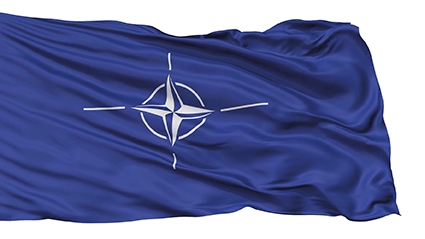NATO Turns 70: Despite Troubles, Alliance Will Be Reinvigorated
This week NATO celebrates its 70th anniversary. This is a notable achievement in comparison with previous military alliances from world history. The historical phenomenon aside, the Alliance is now experiencing an arguably troublesome period, which many believe is the biggest crisis since its creation in 1949.
The US President Donald Trump, ambivalent in his statements about NATO in the pre- and post-election period, has often chastised his European allies for not meeting the 2% threshold of the GDP devoted to NATO alliance.
While on the surface this seems to be the biggest misunderstanding between the trans-Atlantic allies, the Europeans fear that there is something more to this disenchantment. Many fear that Trump's statements are something beyond rhetoric and are actually a strong sign of wide geopolitical changes in the world, where the US now sees the return of the power politics (almost classic 19th century "Realpolitik") back to the Eurasian landmass.
The proponents rightly point to the developments when the US has recently disengaged from numerous trade agreements, rebuked its allies and overall seems to be self-absorbed and distanced from Eurasian affairs, a traditional (major) focus of the country’s foreign policy since the World War II.
The US, rather than withdrawing from all its international commitments, is likely to be redefining its position in the world. The country has simply overextended itself over the past three decades in various wars and confrontations with Iran, Russia, etc. Trump's decisions are more about spending resources more correctly on the US allies and against potential geopolitical rivals, than about undermining the world order. Withdrawal from all its military commitments will certainly embolden the US’ geopolitical rivals such as Russia, China, Iran etc. This will ultimately create a Eurasia which will be able to confront the US moves and may be even shut the country out from the continental affairs. Thus, from Washington’s perspective, leaving Eurasia to its own devices will evolve into a direct threat to the US.
As troublesome as the problems around NATO may indeed seem, still it is an exaggeration to claim that a definitive rupture between the trans-Atlantic allies has taken place.
In fact, in the past decades, the Alliance had a much bigger strategic dilemma when for example, the Soviet Union collapsed: many believed that there was no need to upkeep NATO. Russia was weak, democracy had won in eastern Europe and, most of all, the Cold War had ended, the outgrowth of which was NATO itself. In short, NATO in the 1990s lacked a strategic reason for its future existence.
Nowadays, the crisis within is less about grand strategy and more about finances. The US is worried it has acted as the sole spender in the Alliance and believes the situation must change. A definitive rupture within the Alliance is unlikely to take place as, unlike in the 1990s, now NATO has a strategic vision: keeping Russian influence in eastern Europe/the former Soviet space at bay. This will play as a powerful motivator for the Alliance, as will China’s and Iran’s geopolitical agendas in Asia-Pacific and Middle East, respectively.
Without NATO, European resolve to pursue a more or less unified/coordinated foreign policy vis-à-vis Russia will be undermined. The US decision-makers understand this as they know what this will mean for US interests in Europe in the future. The European Union, which makes up the bulk of the NATO alliance, is as divided into numerous countries as it has ever been. For Russia, historically it was easy to play one European power against the other. NATO thus serves as the sole instrument to keep Russia distanced from intervening in European affairs.
Based on these strategic imperatives, the US support and commitment for the Alliance will likely increase. In such circumstances, it is also likely that NATO will push into Ukraine and Georgia will be strengthened.
As a sign of the US commitment, NATO Secretary General Jens Stoltenberg delivered a speech to the joint US congress session on April 3. The US Vice President Mike Pence on the same day criticized Germany for not spending enough on defense, warned Turkey against going ahead with the purchase of a Russian missile defense system, S-400, and sought to reassure NATO allies that they will have US support.
By Emil Avdaliani












